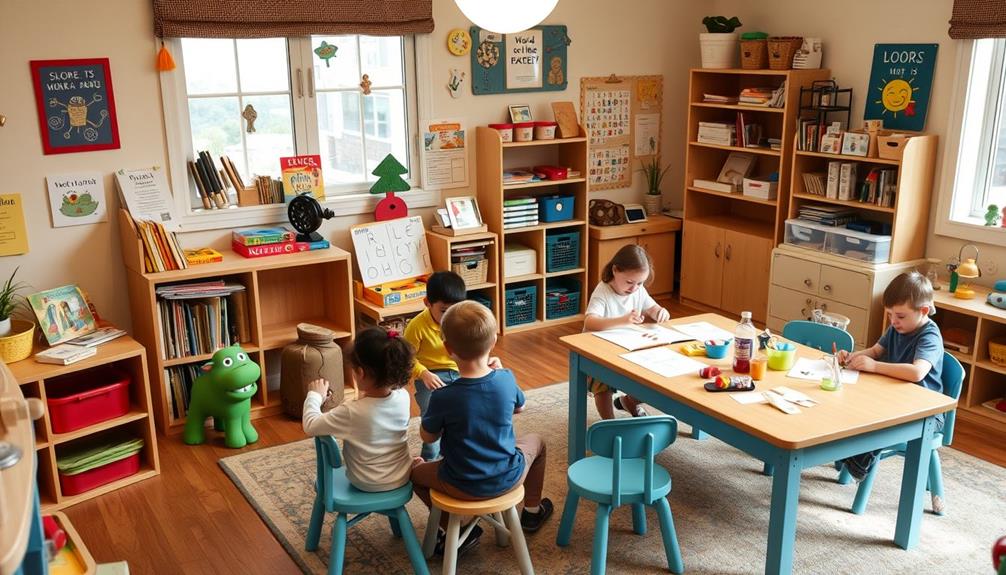As a new parent turned homeschooler, effective classroom management is key to fostering a productive learning environment. Start by setting clear expectations for behavior and academic performance; document these expectations where everyone can see them. Create a structured routine to enhance focus and engagement, and involve your child in establishing rules to encourage responsibility. Consistent reinforcement of positive behavior helps maintain discipline and accountability. Don't forget to adapt your approach to fit your child's unique needs and interests. Continue exploring various strategies to transform your homeschooling experience into one that's both enjoyable and educational.
Key Takeaways
- Establish clear behavior expectations and document them to create a structured learning environment and enhance accountability.
- Consistently communicate and enforce consequences to reinforce behavior standards and promote a predictable learning atmosphere.
- Incorporate routines and visual schedules to provide security and help children focus on their learning tasks.
- Engage children in creating classroom rules to foster ownership and responsibility for their behavior and learning.
- Adapt teaching methods and schedules to meet individual needs, promoting flexibility and encouraging exploration of personal interests.
Understanding Classroom Management
When you start your homeschooling journey, understanding classroom management is essential for creating an effective learning environment. Balancing the roles of parent and educator can complicate expectations, so clear communication of rules and consequences is vital.
Establishing unified behavior standards simplifies enforcement and provides consistency, ensuring your children understand what's expected both during and outside of formal learning times. Incorporating strategies for fostering a creative environment at home can also enhance your approach to classroom management, inspiring innovative learning experiences.
Effective classroom management strategies involve setting clear expectations for noise levels, participation, and respect. By doing this, you enhance the overall learning atmosphere at home, making it conducive to education.
Documenting these behavior expectations visibly within your home can further aid adherence, encouraging accountability among your children. This visibility reduces potential conflicts about fairness and discipline, making it easier for everyone to understand and follow the established norms.
As you gain experience in managing classroom dynamics, you'll find that your strategies can adapt to your family's unique needs and learning styles. Over time, you'll refine your approach, making your homeschooling experience smoother and more enjoyable for both you and your children.
Establishing Clear Expectations

When you establish clear behavior standards, you're setting the foundation for a productive homeschool environment.
Incorporating techniques for stress management into your routine can also help create a calm learning atmosphere.
It's essential to communicate consequences clearly so your child understands the implications of their actions.
Define Behavior Standards
Setting clear behavior standards is essential for creating a productive homeschooling environment. By defining behavior expectations from the beginning, you provide a consistent framework for your child to understand what's required of them. This clarity minimizes confusion and fosters a sense of structure in your homeschooling routine.
Consider documenting these behavior expectations in a visible format, such as a chart or poster, to reinforce the standards.
Here are three key aspects to keep in mind:
- Consistent Enforcement: Apply the same rules across all settings to help your child grasp acceptable behavior.
- Open Communication: Regularly review and discuss these standards with your child, allowing for adjustments based on their developmental needs.
- Ownership and Responsibility: Involve your child in the process of creating these expectations. When they contribute, they're more likely to take ownership and feel responsible for adhering to them.
Communicate Consequences Clearly
Clearly communicating consequences helps reinforce the behavior standards you've established. When you set clear behavior expectations, your children can understand the consequences of their actions. This understanding is vital for creating a consistent learning environment in your school at home. Documenting these expectations in writing and displaying them prominently can enhance accountability and comprehension.
It's important to communicate consequences clearly, both positive and negative. When children recognize the patterns associated with their behavior, they're more likely to make informed choices. Consistency in applying these consequences simplifies disciplinary actions, making it easier for you to maintain order in your homeschooling routine.
Consistent Reinforcement Strategies
Establishing clear expectations for behavior and academic performance is essential for creating a structured learning environment at home. When you define these expectations, it helps your children understand what's required of them. Implementing consistent reinforcement strategies is key to promoting accountability and fostering positive behavior.
To establish these expectations effectively, consider the following:
- Document Behavior Expectations: Write down the rules and consequences, ensuring that everyone understands them. This reduces confusion and promotes a shared understanding.
- Praise Positive Behavior: Regularly acknowledge and reward your child's good behavior. Positive reinforcement encourages them to continue meeting those behavior expectations.
- Apply a Unified Behavior Plan: Use the same consequences across different contexts, like schoolwork or chores. This consistency simplifies management and helps your child internalize the importance of maintaining expected behavior.
Creating a Structured Environment

A well-structured environment cultivates a sense of security and predictability for homeschooled children, which is essential for their focus and engagement. Establishing a consistent daily routine helps create this structured environment, enhancing their ability to concentrate on learning activities.
Incorporating elements of play, such as various types of play, can further enrich the learning experience and stimulate creativity. When you set clear expectations for behavior and learning outcomes, it fosters a respectful and orderly atmosphere, allowing your children to understand the boundaries within their educational space.
Utilizing visual schedules and charts can notably aid in reinforcing daily tasks and responsibilities, making it easier for your children to navigate their learning environment independently.
Consider designating specific learning areas within your home, like a quiet study space or a creative corner. These spaces help minimize distractions and provide a conducive environment for focused study sessions.
Regularly reviewing and adjusting the structure based on family dynamics and your children's evolving needs guarantees that the learning environment remains effective.
Unified Discipline Strategies

To create a unified discipline strategy, you need to establish consistent behavior expectations across your homeschooling environment.
Incorporating techniques from caregiver support resources can enhance your approach by providing emotional support and understanding during challenging moments.
Clear communication channels among parents and children will help reinforce these expectations, making it easier for everyone to understand the rules.
Consistent Behavior Expectations
In homeschooling, setting consistent behavior expectations is essential for fostering a productive learning environment.
When you establish a unified behavior plan, it guarantees that all your children understand the same consequences for their actions. This reduces confusion and promotes consistency across different learning settings, ultimately leading to fewer behavior issues.
To effectively implement consistent behavior expectations, consider the following strategies:
- Document Expectations: Write down behavior standards and display them in a visible area at home to reinforce what's expected.
- Apply Consequences Equally: Use the same consequences for poor behavior during homeschooling and outside activities. This reinforces accountability and helps children understand the importance of maintaining consistent behavior.
- Regular Updates: Regularly assess and update your behavior expectations based on observations. This keeps your framework relevant to your children's evolving needs.
Clear Communication Channels
Clear communication channels are essential for implementing unified discipline strategies in your homeschooling environment. Establish a clear discipline plan that outlines your behavior expectations, guaranteeing it's documented and displayed prominently in your home. This reinforces accountability and clarity for everyone involved.
By engaging in open communication with your children about these expectations, you create a collaborative atmosphere where they feel respected and understood. This not only improves their compliance but also fosters mutual respect for the rules you've set.
Consistency is key; applying your discipline strategies uniformly helps simplify the administration of consequences, allowing your children to grasp the importance of behavior standards.
Remember to keep your discipline plan flexible. Regular updates based on your family's evolving dynamics and your children's needs guarantee that your strategies remain relevant and effective.
Clear communication channels support this adaptability, making it easier for everyone to stay on the same page. By prioritizing these practices, you'll create a harmonious homeschooling environment that encourages positive behavior and fosters a love for learning.
Engaging With Your Child

Engaging with your child in meaningful conversations about their interests sparks a genuine love for learning. When you share your enthusiasm for various topics, it encourages them to explore new ideas and skills. Incorporating diverse activities can make the learning experience more enjoyable and effective.
Consider these approaches:
- Reading Aloud: Choose books that align with their interests, enhancing comprehension and vocabulary while creating special bonding moments. Additionally, you can incorporate stories that highlight the importance of sleep quality to reinforce healthy habits.
- Hands-on Activities: Engage in practical tasks like cooking or gardening, which connect academic concepts to real-world applications, making learning tangible and fun.
- Self-Directed Exploration: Encourage your child to pursue their passions independently. This freedom fosters a sense of ownership over their learning journey and deepens their engagement.
Celebrating your child's achievements, no matter how small, boosts their self-esteem and reinforces a positive learning environment.
Utilizing Resources and Tools

Homeschooling can feel overwhelming at times, but utilizing available resources and tools can streamline your teaching process. Start by exploring free daily and weekly homeschool progress printables; these can help you track lesson completion and enhance your organization.
You might also consider incorporating tools that offer insights into key factors in choosing a home cleaning service to keep your learning environment tidy and productive. Libraries and online courses are also valuable resources that provide a wealth of materials across different subjects, catering to your child's interests.
Consider enrolling your child in co-op classes, where you can access expert help in subjects you mightn't feel confident teaching. These classes offer additional support and enrichment, making learning more engaging for your child.
If you need further assistance, hiring a tutor can be an excellent way to fill any gaps in your knowledge.
To maintain clarity in your homeschooling environment, document behavior expectations in writing. This guarantees everyone understands the rules and consequences, which aids in effective classroom management.
Adapting to Individual Needs

Having a well-organized homeschool environment sets the stage for adapting to individual needs in your child's learning journey. Recognizing that each child is unique means you can tailor your teaching approaches, making learning more effective and enjoyable.
Just as veganism promotes a tailored approach to diet based on individual health needs, regular evaluations of your children help identify their strengths and weaknesses, allowing you to adapt your methods accordingly.
Here are three strategies to enhance this supportive atmosphere:
- Encourage Interests: Let your children pursue their passions. This engagement makes learning more meaningful and motivates them to excel.
- Flexible Scheduling: Be open to adjusting lesson plans based on your child's immediate needs and preferences. Flexibility allows for deeper exploration of topics they find intriguing.
- Promote Open Communication: Create a space where your children feel safe to express their learning struggles. This builds self-confidence and empowers them to take ownership of their education.
Frequently Asked Questions
Why Are Parents Switching to Homeschooling?
Parents are switching to homeschooling for several reasons. You might want to tailor your child's education to their interests and learning styles, fostering a love for learning.
The flexibility in scheduling allows you to create a relaxed environment that suits your family's needs. Plus, homeschooling strengthens family bonds through shared activities.
You may also seek hands-on learning experiences and worry about socialization or the quality of education in traditional schools.
How to Be a Happy Homeschool Mom?
To be a happy homeschool mom, focus on self-care and simplify your routines.
Prioritize quality time with your kids, fostering strong relationships through fun activities.
Embrace flexibility in learning and celebrate small victories to keep motivation high.
Building a supportive community can alleviate feelings of isolation, providing encouragement when you need it most.
How Do You Manage Working From Home and Homeschooling?
To manage working from home and homeschooling, you need structure, boundaries, and communication.
Set a consistent daily routine, block out specific times for work and lessons, and create a designated workspace.
Talk openly with your kids about your work commitments, encouraging independent learning during those hours.
Incorporate flexible activities, like educational videos or reading, that require minimal supervision.
How Do You Discipline Homeschoolers?
Disciplining homeschoolers involves setting clear expectations and consequences. You should document these rules in writing to avoid confusion and guarantee everyone understands what's expected.
Consistently applying consequences for misbehavior simplifies discipline and helps maintain order. Regularly reviewing these expectations keeps them relevant as your children grow.
Try to detach emotionally from misbehavior, allowing you to address issues calmly and effectively, which sets a professional tone for your teaching environment.
Conclusion
In the world of homeschooling, the theory that kids thrive in chaos is simply a myth. By implementing effective classroom management techniques, you can create a nurturing, structured environment that fosters learning and growth. Remember, clear expectations and unified discipline aren't just rules; they're the foundation for success. So, embrace these strategies, engage with your child, and watch them flourish academically and emotionally. After all, a well-managed classroom can transform both your teaching experience and your child's education.










